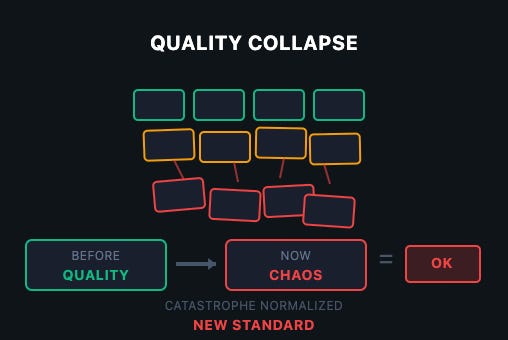Software has a serious “one more lane will fix traffic” problem.
Don’t give programmers better hardware or else they will write worse software. End of.
I’ve been working at a small company where I own a lot of the code base.
I got my boss to accept slower initial work that was more systemically designed, and now I can complete projects that would have taken weeks in a few days.
The level of consistency and quality you get by building a proper foundation and doing things right has an insane payoff. And users notice too when they’re using products that work consistently and with low resources.
This is one of the things that frustrates me about my current boss. He keeps talking about some future project that uses a new codebase we’re currently writing, at which point we’ll “clean it up and see what works and what doesn’t.” Meanwhile, he complains about my code and how it’s “too Pythonic,” what with my docstrings, functions for code reuse, and type hints.
So I secretly maintain a second codebase with better documentation and optimization.
(I write only internal tools and I’m a team of one. We have a whole department of people working on public and customer focused stuff.)
My boss let me spend three months with absolutely no changes to functionality or UI, just to build a better, more configurable back end with a brand new config UI, partly due to necessity (a server constraint changed), otherwise I don’t think it would have ever got off the ground as a project. No changes to master for three months, which was absolutely unheard of.
At times it was a bit demoralising to do so much work for so long with nothing to show for it, but I knew the new back end would bring useful extras and faster, robust changes.
The backend config ui is still in its infancy, but my boss is sooo pleased with its effect. He is used to a turnaround for simple changes of between 1 and 10 days for the last few years (the lifetime of the project), but now he’s getting used to a reply saying I’ve pushed to live between 1 and 10 minutes.
Brand new features still take time, but now that we really understand what it needs to do after the first few years, it was enormously helpful to structure the whole thing to be much more organised around real world demands and make it considerably more automatic.
Feels food. Feels really good.
I think a substantial part of the problem is the employee turnover rates in the industry. It seems to be just accepted that everyone is going to jump to another company every couple years (usually due to companies not giving adequate raises). This leads to a situation where, consciously or subconsciously, noone really gives a shit about the product. Everyone does their job (and only their job, not a hint of anything extra), but they’re not going to take on major long term projects, because they’re already one foot out the door, looking for the next job. Shitty middle management of course drastically exacerbates the issue.
I think that’s why there’s a lot of open source software that’s better than the corporate stuff. Half the time it’s just one person working on it, but they actually give a shit.
True, but this is a reaction to companies discarding their employees at the drop of a hat, and only for “increasing YoY profit”.
It is a defense mechanism that has now become cultural in a huge amount of countries.



